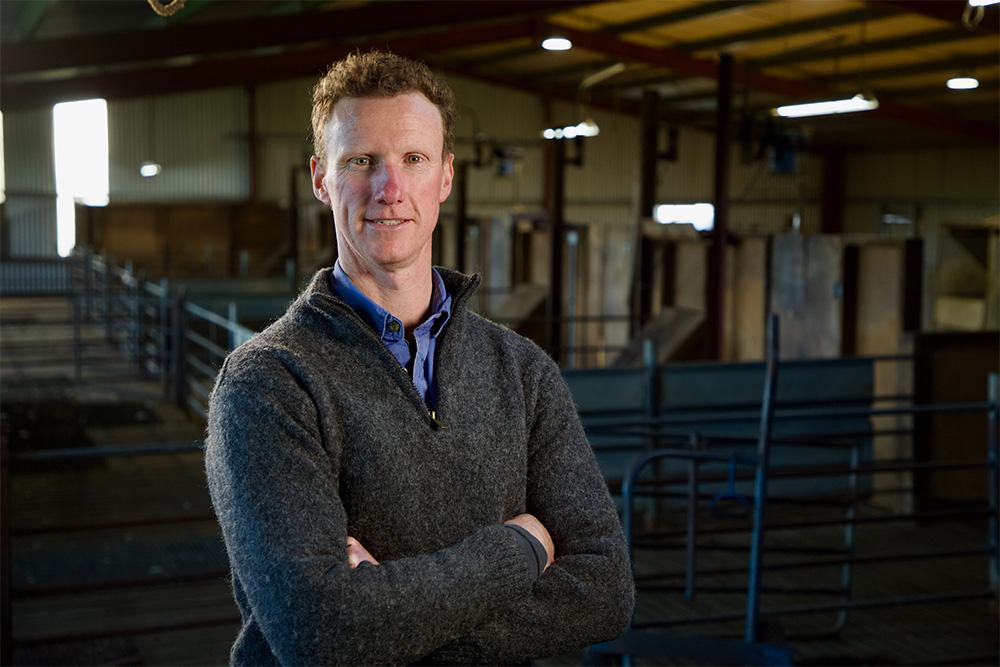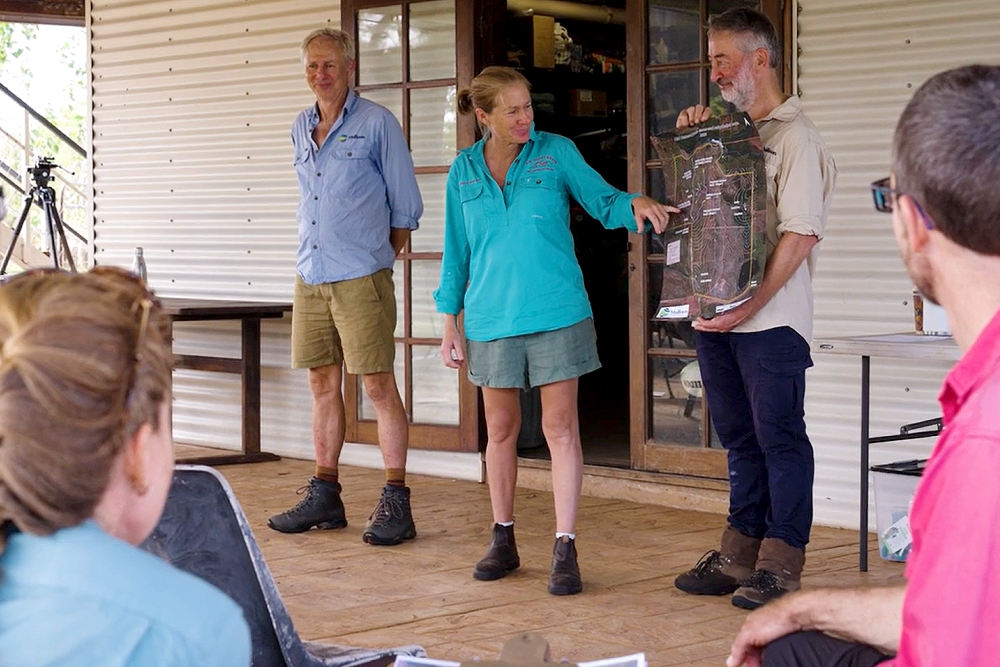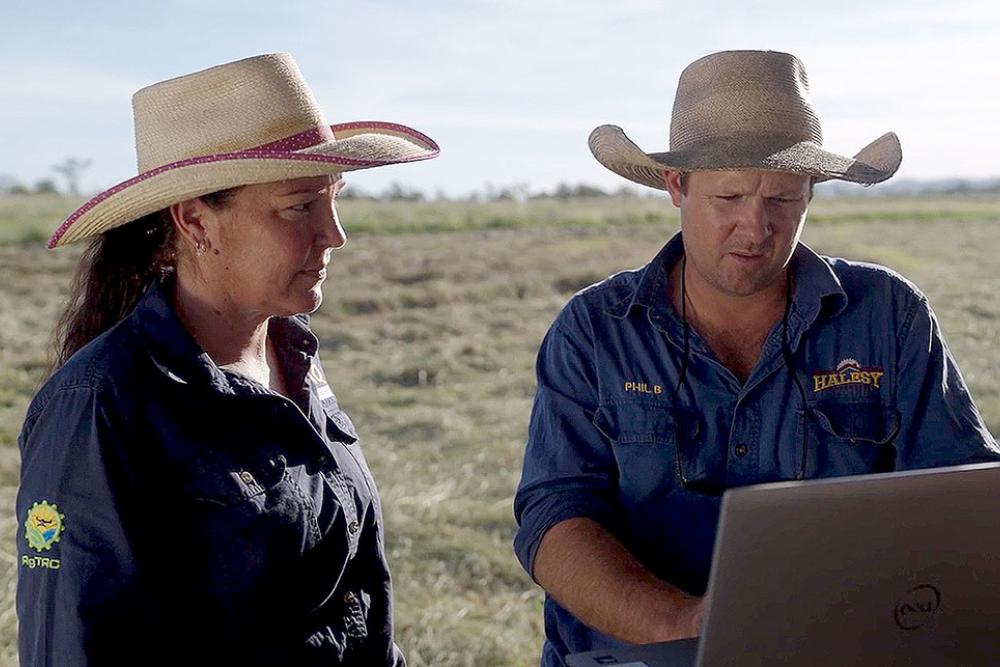Cam and Bianca Schultz are no strangers to the highs and lows of farming. Their property, Claverton Farm in Culcairn NSW, spanning approximately 3,000 acres and supporting around 7,000 head of sheep, has faced its share of climate challenges, from prolonged droughts to extreme wet seasons.
Like many Australian farmers, Cam and Bianca Schultz needed a strategic approach to strengthen their business and future-proof their farm. The Farm Business Resilience Program provided them with the tools to make better business decisions and remain on the land for generations to come.
"Our goal isn’t to put up a 'For Sale' sign on the farm gate—it’s to be in a position to buy the property next door when it comes up for sale." This vision drives Cam and Bianca in their approach to resilience and long-term sustainability.
Cam and Bianca joined the Farm Business Resilience Program seeking guidance and direction. "We were lacking strategies to move forward," says Cam. "Having a coach to provide direction and help us implement changes has been invaluable."
A key area of focus was mindset and resilience, which has been critical in adapting to both drought conditions and extremely wet seasons. "If you drop your head and think you can't possibly get through, you're already on the back foot," Bianca explains. "The mindset coaching we received has given us tools to approach challenges with a problem-solving attitude."
Through the program, Cam and Bianca have implemented structured planning, including weekly meetings and job lists to improve efficiency. This structured approach has improved workflow, minimised stress, and allowed more time for what matters most—family.
"We have four kids, and ensuring we have quality time with them is a huge priority. The changes we’ve made allow us to balance our farm and family life better" Bianca says.
With the skills and strategies gained from the Farm Business Resilience Program, Cam and Bianca are more optimistic about their future.
"We now have clear goals, trigger points, and policies in place to help us stay on track and avoid setbacks" says Cam.
Rather than being forced to consider selling, their focus is on expansion and sustainability.
Find out how, by building resilience, the Schultz family is securing a future where their farm business not only survives, but thrives.
Claverton Farm: Strengthening resilience through the Farm Business Resilience Program
Video duration: 2mins 58 secs
Introduction
This is the transcript of a video case study produced by the Australian Government's Future Drought Fund and the New South Wales Government Farm Business Resilience Program. The video is of Cam and Biance Schultz talking about the benefits of the Farm Business Resilience program.
Learn more about the Future Drought Fund and Farm Business Resilience program.
[Recording begins]
Video begins [0:00]
Music plays.
Bianca Schultz [0:07]
We’re Cam and Bianca Schultz. Our farm name is ‘Claverton’ in Culcairn NSW. So, we're situated a half hour north of Aubry Wonga and we're a mixed farming operation. We run about 7,000 head of sheep on approximately 3,000 acres each year.
We took part in the farm business resilience program for the coaching, to have someone to give us a bit of direction. We were just sort of lacking in strategies and implementing things to move forward.
Cam Schultz [0:36]
Our goals are to keep expanding short term, probably just to consolidate a bit and you know really find our feet where we are, and then take the next steps going forward. Now, you know like we've come a long way in the last 10 years.
Bianca Schultz [0:51]
The aspects that we've worked on within the coaching program have been mindset which has been a pretty big one for us which has in turn helped with resilience. If you drop your head and you just think oh I can't possibly do this and can't see a way forward… with the tough times coming out of the drought and then coming into wetter years. Wetter years are a pretty big struggle for us. Where as where with the mindset and coaching that Gay has really provided us… with the education, that side of things has been huge. Gay's been fantastic in guiding us through those tougher times, where we have had a couple of very wet seasons and wet harvests.
Cam Schultz [1:30]
When I first started the program I was very hot-headed and just flew off the handle for no real reason. I mean something had gone wrong, but throughout the program I've really changed my mindset of how I do things now as opposed to just flying off the handle and achieving nothing. Now I just sort of take a step back and look at it and go… well yes it's bad, but it's happened, but there's got to be a way to fix it.
We’ve gone about weekly meetings now and we write job list out, so we can turn up each day… you know some days I don't even see some of the staff now because they got their jobs to do. They just turn up and know yep this is what I'm going to do today. You know, I prioritize things throughout their lists and away they go, it really does free up a bit of time for myself you know, to do some things that are more important.
Biance Schultz [2:16]
A big thing for us is family, so we really really want to have more time with our four kids growing up because you can never get that time back. Within the farm business resilience program, we're a lot more optimistic and positive towards our future direction. We’re putting the goals in place and knowing what to look for. As Cam said before the trigger points, policies and procedures and strategies to avoid going backwards because at the end of the day it's not our goal to put a full sale sign on the front gate, it's to buy the next-door property that's got the for sale sign on it.
Recording ends [2:58]
End screen displays the website droughthub.nsw.gov.au/programs/farm-business-resilience-program and also farmbusiness@dpi.nsw.gov.au for more information. Also says the project is jointly funded by the Australian Government’s Future Drought Fund and the New South Wales Government and the relevant government logos are also displayed.



